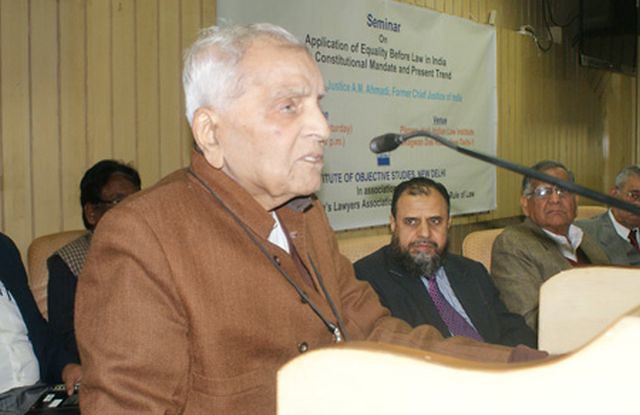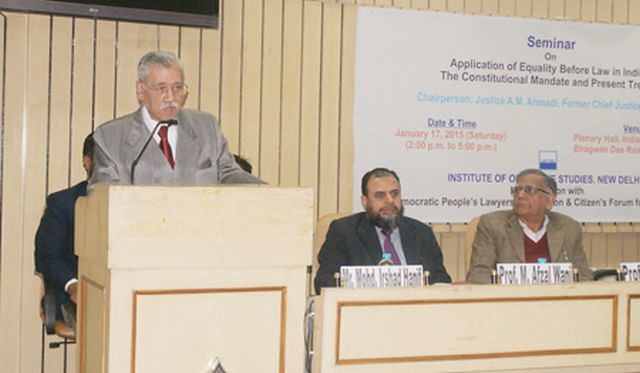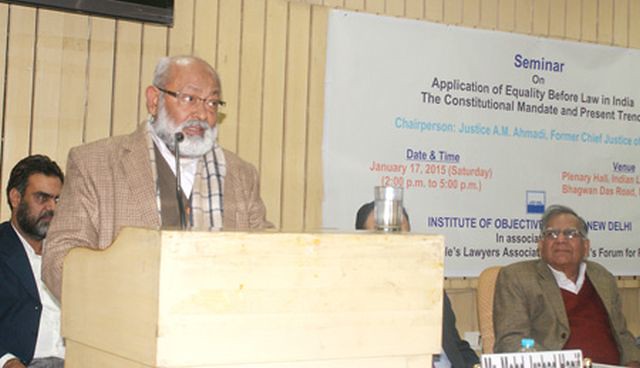By TCN News,
New Delhi: Justice Rajinder Sachar, former Chief Justice of the Delhi High Court and a noted public figure, has said the country is currently passing through a difficult phase of its history, however, there was no cause for despondency as it had not weakened yet.
Referring to secularism, Sachar noted that it found mention in the Preamble to the Indian Constitution and was thus the key to the Constitution. “Secularism was the basic structure of the Constitution. Secularism did not signify anti-religion as the state would have no religion of its own, according to a ruling of the Supreme Court of India,” Sachar said during a seminar on ‘Application of Equality Before Law in India: The Constitutional Mandate and Present Trend’ here.

Justice Rajinder Sachar, Former Chief Justice of the Delhi High Court
The seminar was jointly organised by the Institute of Objective Studies, Democratic People’s Lawyers Association and Citizens’ Forum for Rule of Law at the Indian Law Institute on Sunday, January 17.
Sachar contended that this vindicated the Hadith of the Prophet of Islam (SW) that a white skinned person had no supremacy over a black skinned one. He said that the American struggle for equality, centuries after the Prophet (PBUH), upheld the same concept. Holding the Muslims and the Christian “not outsiders”, he observed that inclusive development was a must for the progress of the country. “No die-hard Hindu could claim that he had exclusive sovereignty over his religion. Vivekanand believed that without Islam, Vedanta philosophy was valueless as Islam was the only hope for the country.”
Defending the rights to the minorities guaranteed under the Constitution, he said that even the UN Human Rights Council held in 2010 called for no discrimination against minorities in matters of employment. Pleading for “targeted approaches” for inclusive development of the minorities, he insisted that the data on the diversity of their living must be honestly collected.
Referring to the findings of the team of the Peoples’ Union for Civil Liberties (PUCC) sent to Muzaffarnagar in the wake of communal riots in 2013, he favoured Muslim inspectors of police in Muslim-dominated areas to inspire confidence among them. He quoted excerpts from a speech of the first Union Minister for Education Maulana Azad in which he felt proud to be a Muslim and described Hindus and Muslims as rivers Ganga and Yamuna without saying anything against Hinduism.
He said that both Hindus and Muslims shared a common heritage and common nationality. This gave the message of democracy and equality, he said, and termed it as heretic to say that India belonged to a particular religion. He concluded by saying what Sir Syed Ahmed Khan said about the commonness of Indians in 1877 and was repeated by Mahatma Gandhi in 1920.
Deepak Kumar Singh, advocate, Supreme Court, defined equality as water which changed shape wherever it went. He said that the equality was defined by its meaning. “While in Fascism, it meant something, it had a totally different meaning under laissez-faire and market economy.”

Justice A.M. Ahmadi, Former Chief Justice of India
Explaining the concept of welfare state, he said that one’s right was an individual claim which protected individual right. He submitted that the Constituent Assembly debated the issue of political, social and economic equality as a goal and devised a methodology to achieve it.
In this connection, he quoted the eminent jurist, H M Seervai, who in his monumental work ‘Constitutional Law of India’ observed that welfare state had been downgraded by laissez-faire or the market economy. He held that the framers of the Constitution devised a system of balance between capitalism and socialism with a mixed economy, adding that the concept of welfare state had been changing according to the circumstances.
Blasting the theory of ‘Sarva Dharma Sambhav’ (equal respect for all religions), he said that it was not true, or else the ‘pogrom of 1984’ and the ‘genocide in 2002’ would not have taken place.
Former Chief Justice of India, Justice A M Ahmadi, in his presidential remarks, observed that the Preamble to the Constitution gave a mature idea of equality. Though graded equality in society existed before Independence, the concept of equality found expression in the Constitution. Describing equality as the basic value of our Constitution, he said that it was one of the values of a social order. “The main question today is how to bring up those above the poverty line under which they had been living for a long time. Bringing them up is not discrimination, but an ‘affirmative action’, which is stipulated in the Article 14, 15 and 16 of the Constitution.”
He deplored that the previous government did not implement the recommendations of the Sachar Committee report, which was conscientiously and diligently prepared by Justice Rajinder Sachar. Especially lauding the recommendation to set up the Equality Commission, he believed that it would have helped to do something tangible for the community.
He also read out the famous couplet of Allama Dr Mohd Iqbal: “Khudi ko kar buland itna ki har taqdeer se pahle Khuda bande se khud poochhhe bataa teri raza kya hai.”
Justice Ahmadi said the Maharashtra government had recently removed the chairman of the state minority panel due to his decision to seek information on the number of Muslims languishing in different jails of the state. Certainly, this was a failure of democracy, he noted.

Dr. M. Manzoor Alam, Chairman, IOS
Asking the larger minority to bring under its umbrella other minorities with a view to make a bigger minority, he said: “We have to fight for the concept of equality with determination.”
Dr M Manzoor Alam, chairman of the IOS, explained the rationale behind organising the lecture: “The current political situation warranted deliberations on the Constitution and its application with regard to equality as the present political set up was taking resort to such steps that could undermine the majesty of law and the Constitution.” He informed that the IOS was alive to its duties to bring experts on the Constitution together to share their views and arrive at a consensus.
Those who spoke on the occasion included Dr Eqbal Husain, associate professor of Law, Jamia Millia Islamia; Professor M Afzal Wani, the Dean, School of Law and Legal Studies, GG Singh Indraprastha University, Mohammad Irshad Hanif, advocate, Supreme Court, and Harsh Kumar Gautam from Democratic People’s Lawyers Association. Besides Professor Refaqat Ali Khan, vice chairman of the IOS, a large number of lawyers, law students, social activists and prominent citizens were present on the occasion.

